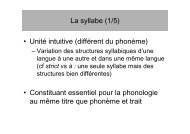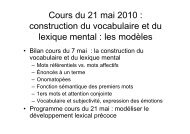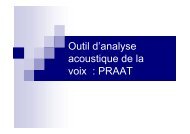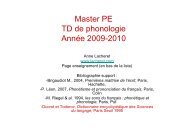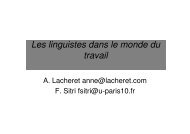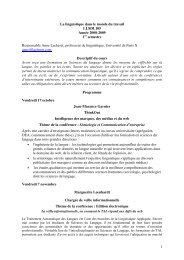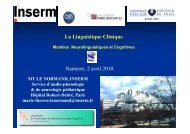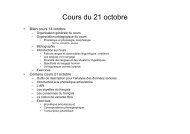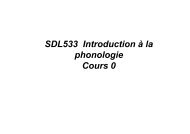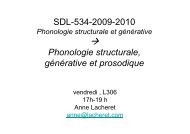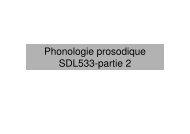You also want an ePaper? Increase the reach of your titles
YUMPU automatically turns print PDFs into web optimized ePapers that Google loves.
equeathed to English prosody. Here is the speech at the end of The Tempest, where to<br />
my mind Shakespeare’s own voice as a poet sounds most clearly, where it dominates<br />
the music.<br />
Our revels now are ended. These our actors,<br />
As I foretold you, were all spirits and<br />
Are melted into air, into thin air;<br />
And like the baseless fabric of this vision,<br />
The cloud-capped towers, the gorgeous palaces,<br />
The solemn temples, the great globe itself,<br />
Yea, all which it inherit, shall dissolve,<br />
And, like this insubstantial pageant faded,<br />
Leave not a rack behind. We are such stuff<br />
As dreams are made on, and our little life<br />
Is rounded with a sleep.<br />
(VI, 1, 148-158)<br />
Here, below the counterpoint of voices, Shakespeare produces a prosodic<br />
counterpoint by juxtaposing lineal periods with grammatical periods. But grammar is a<br />
more formal mode of organization than thought, having less to do with content, and<br />
doesn’t always coincide with it. An argument, whose premises and conclusion are a<br />
good example of a completed thought, often runs over a number of sentences, and<br />
certainly a number of phrases. Small thoughts, like “I do” or “I am” or “Alas” often<br />
form only part of grammatical sentences or phrases. And in a narrative a continuous<br />
thought can be grammatically very broken up, and indeed strung out along many<br />
pages. Thus the counterpoint between lineation and grammar in a poem may itself be<br />
subject to a further articulation, thought, which as its own periods are superimposed<br />
introduces new patterns of reduction and amplification.<br />
Added to this is an aural counterpoint created by repetition of sound. Endrhymed<br />
poems may still include a great deal of alliteration, slant rhyme, and even full<br />
rhyme in the middle of lines. Then our ears register not only the linear period and<br />
alternation of the end rhymes (for example, ABAB) but also the chime that<br />
complicates it: three occurrences of sibilance in one line, for example, or a glottal stop<br />
in the middle of a line echoing another in the middle of the next. And poems that have<br />
no end-rhyme, like Shakespeare’s blank verse here, are often knit together aurally by<br />
frequent alliteration, slant rhyme, and full rhyme set internally in the lines, often<br />
before caesuras; in which case we hear their submerged periods, in connection with<br />
the interplay of line and caesura-unit. Another aural effect created by caesuras in<br />
highly enjambed poems is a counterpoint of the pauses expected at the end of lines<br />
with the pauses that occur mid-line as they frame a completed thought or grammatical<br />
unit, for they often rush over the end of a line like rapids, so that what remains is only<br />
the ghost of a pause, a pause not taken, which we none the less register.<br />
A similar effect is the counterpoint created between the regular metric pattern<br />
of a line and the ordinary patterns of speech. Ordinary speech may demand an<br />
emphasis or temporal extension just where the regular metric pattern demands a brief<br />
light syllable; every poet knows that this juxtaposition of expectations can produce<br />
extraordinary effects, which when successfully accomplished make the reader hear<br />
two, or even perhaps three things at once. We hear the speech pattern (that we know<br />
well from our everyday life) and the metrical pattern (that the poet has successfully<br />
established in the foregoing lines) virtually as aural ghosts behind the resultant<br />
outcome, which is a combination of both and what we “really” hear. Actors<br />
65



